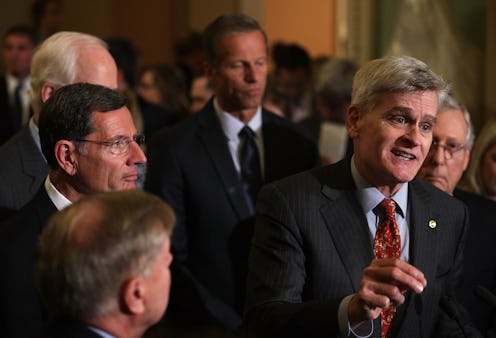News
Graham-Cassidy Claims "Reinsurance" Will Help Insurers Manage Risk

Monday night's CNN debate on health care brought all four participating senators to their feet by the halfway point. Tensions seemed to be running fairly high for Sens. Bill Cassidy and Lindsey Graham on one side, and Sens. Amy Klobuchar and Bernie Sanders on the other. Wonky talk detailing intricate policy discrepancies was largely absent for the first 45 minutes, but one term bandied about that may stump some viewers watching the Graham-Cassidy debate is "reinsurance."
The goal of reinsurance is to keep premiums affordable for generally healthy insurance enrollees. It refers mostly to government subsidies paid to insurance companies to help cover the costs of customers who require substantially more financial assistance than the average.
The Graham-Cassidy bill appears to slow the rate of reinsurance growth, meaning the government won't exactly cut reinsurance payouts so much as ensure they don't continue expanding.
In a straightforward insurance setup, the risk of the pool as a whole determines the premium cost to each member. Ergo, if a substantial number of people signing up for insurance have serious health conditions that require major expenditures, those fees will be distributed amongst all insurance holders. That inevitably means higher premium payments, even for people with no major medical needs. Reinsurance is the government's attempt to offset that rate hike.
The expectation of rising premiums in a new insurance market tends to be higher, since people who are sick are more likely to seek out insurance coverage in the first place. This is known as adverse selection, and anticipating the market effects of such a skewed insurance pool is the rationale behind reinsurance.
In July, the "Problem Solvers" bipartisan caucus in the House of Representatives presented their plan to improve Obamacare, a set of ideas that included expanding reinsurance. Within what they called a "dedicated stability fund," the plan would guarantee that states and insurers would not suffer enormous financial losses (which would likely result in enormous hikes to premiums).
The issue of reinsurance is important to insurance companies, as the instability and unpredictability of the marketplace makes setting premium rates a guessing game. For instance, if the "dedicated stability fund" proposed by the Problem Solvers caucus passed and could be relied upon, then insurance companies could more confidently set rates.
In fact, the constant threat of repeal can interfere with normal market functions. When insurance companies don't know what government regulations may or may not exist next year, that makes operating in a "business as usual" manner all but impossible.
Monday night's argument about reinsurance may not matter though, as Republican Sen. Susan Collins announced shortly before the debate kicked off that she will not be voting for Graham-Cassidy.
Collins made her announcement just after the Congressional Budget Office (CBO) released its assessment of how Graham-Cassidy would impact health care in America. According to the CBO, millions of people currently insured would lose their coverage. Collins also opposed the drastic cuts to Medicaid, the threat of inaccessible coverage for people with preexisting conditions, and the general rushed nature of debate on the bill. “This is simply not the way we should be approaching an important and complex issue that must be handled thoughtfully and fairly for all Americans," Collins said.
It is probably the hope of many politicians on the Hill, not to mention millions of Americans covered under the Affordable Care Act, that Congress will now find a bipartisan way to move forward. Like the Problem Solvers caucus, there exists a will amongst some to improve and fix the health care system as is. And that solution probably involves reinsurance.
More to come ...